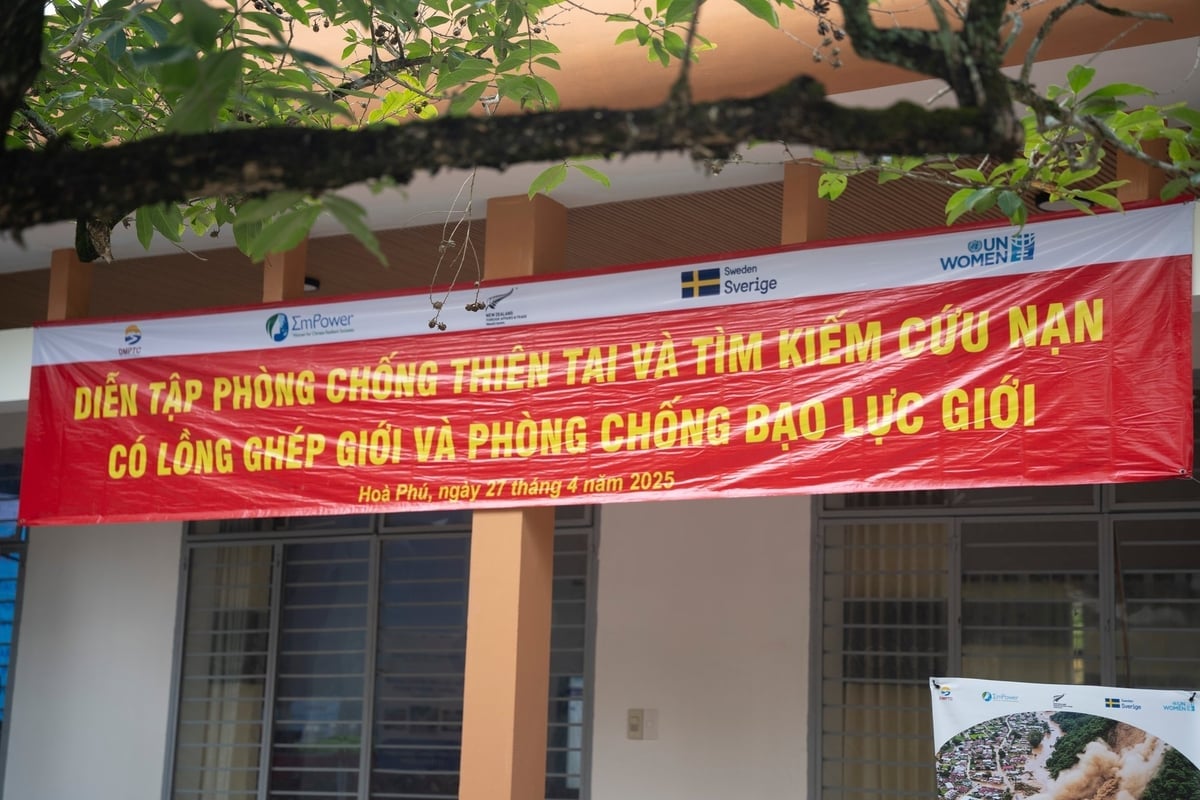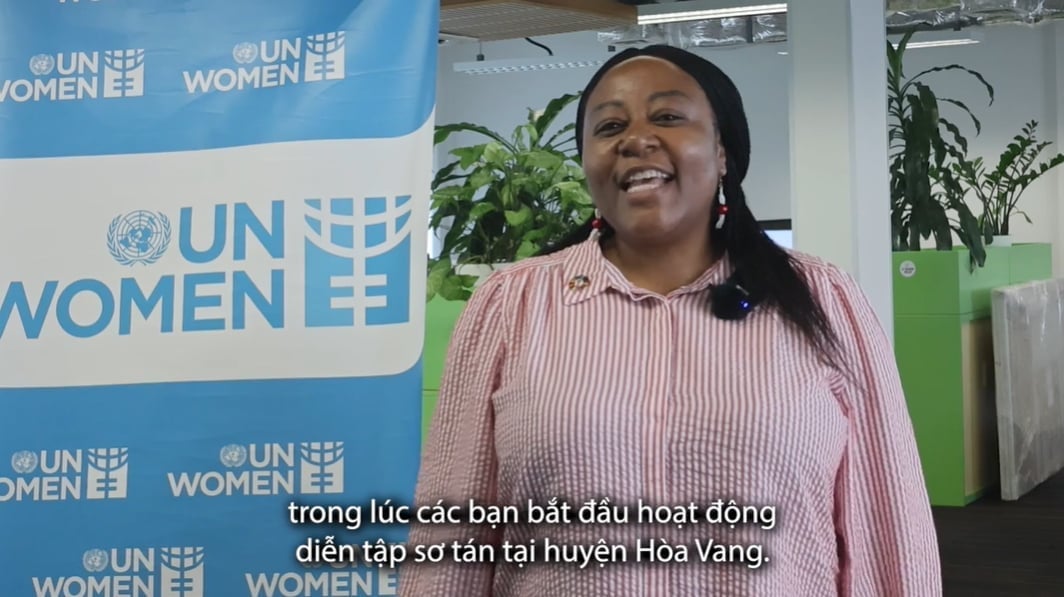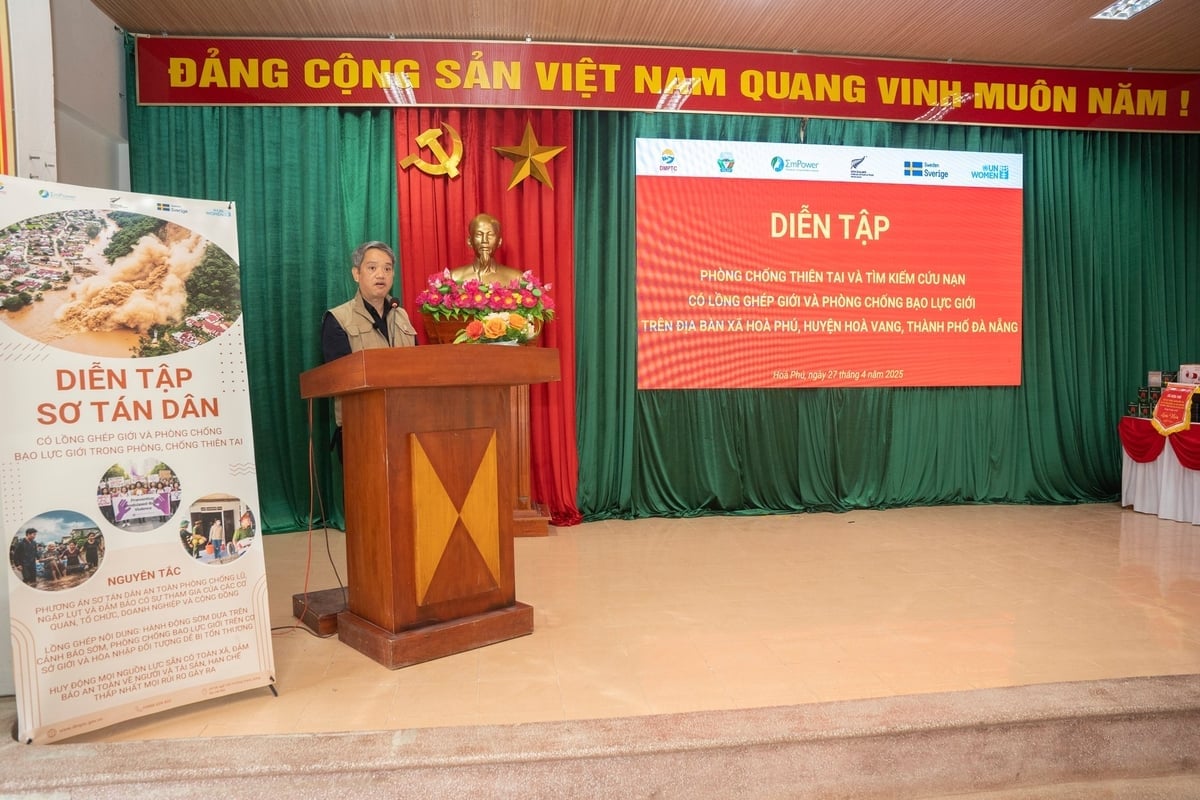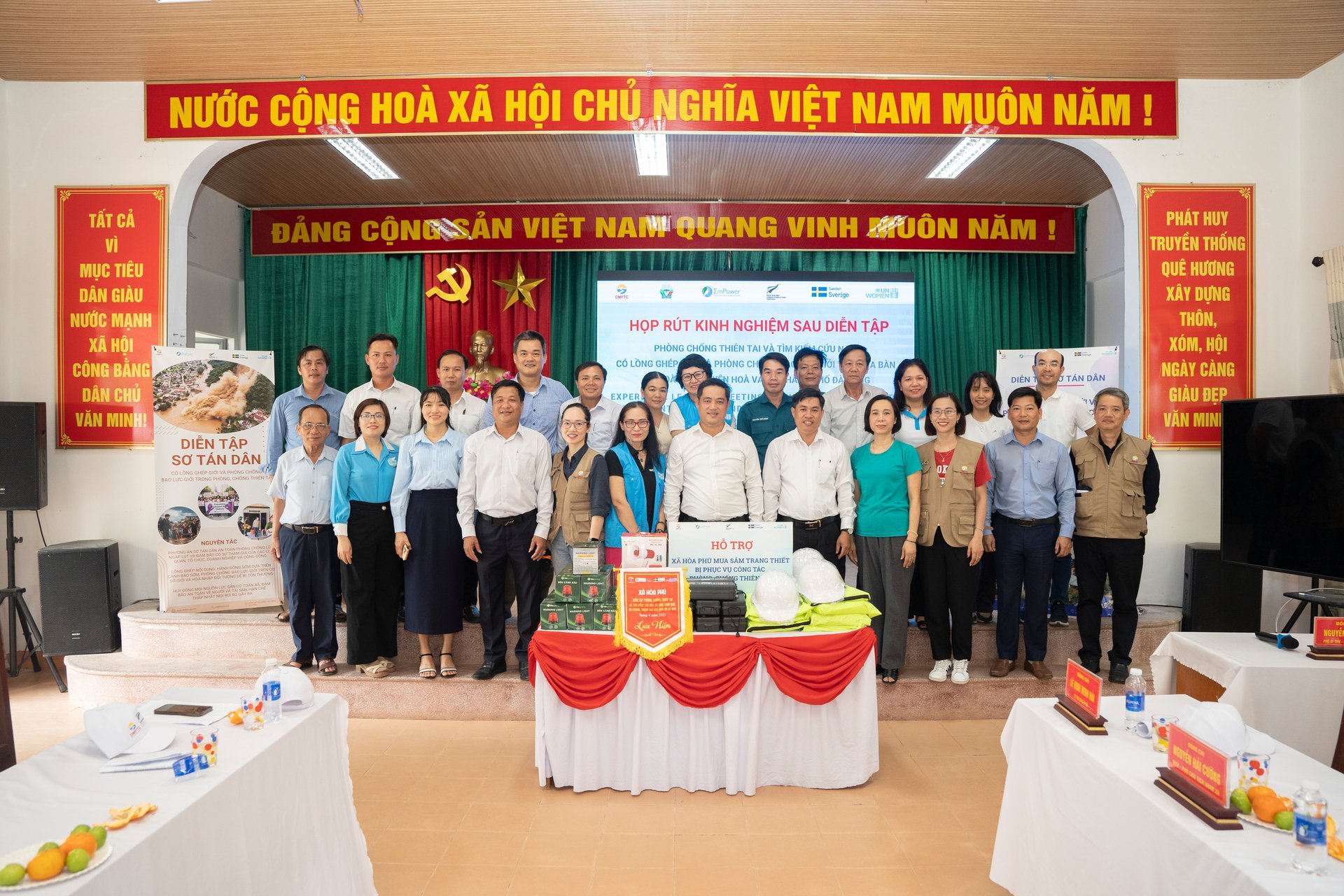May 29, 2025 | 17:30 GMT +7
May 29, 2025 | 17:30 GMT +7
Hotline: 0913.378.918
May 29, 2025 | 17:30 GMT +7
Hotline: 0913.378.918

A gender-inclusive disaster preparedness drill in Hoa Phu commune, Da Nang, aims to improve protection for women, children and vulnerable groups. Photo: Hong Ngoc.
On the morning of April 27, nearly 300 residents of Hoa Phu commune (Hoa Vang district, Da Nang city) participated in a disaster prevention, preparedness, and search-and-rescue exercise that included gender aspects and the prevention of gender-based violence. It was the first time that the city implemented a comprehensive exercise model with the objective of more effectively and equitably safeguarding women, children, the elderly, and individuals with disabilities during disasters.
The Disaster Management Policy and Technology Center (under the Directorate of Water Resources and Disaster Management, Ministry of Agriculture and Environment) co-organized the program in collaboration with the Steering Committee for Disaster Prevention and Search-and-Rescue of Hoa Phu Commune. UN Women provided technical support, and the governments of New Zealand and Sweden offer funding.
Women and children are at a disproportionately high risk of mortality, loss of livelihoods, and difficulties in recovery during disasters, as indicated by research conducted by the United Nations. Response plans must be sensitive and responsive to the diverse requirements of communities, as the risk of gender-based violence increases during emergencies.

Ms. Caroline T. Nyamayemombe, UN Women Representative in Vietnam, spoke online, emphasizing the importance of integrating gender factors in disaster response. Photo: Hong Ngoc.
Ms. Caroline T. Nyamayemombe, UN Women Representative in Vietnam, underscored the importance of the online training exercise, stating, "Today's training session encourages us to contemplate how we can more effectively address the needs of women, children, persons with disabilities, and other vulnerable groups. If these needs are not addressed promptly, the recovery process will be hindered and community resilience weakened.”
Ms. Rebecca Wood, the Deputy Ambassador of New Zealand to Vietnam, also remarked remotely: "This exercise represents a significant advancement in the provision of emergency responses that are inclusive, gender-sensitive, and responsive to the diverse needs of all community members, irrespective of their gender, age, or ability. We hope this exercise reinforces the message that gender considerations should not be an afterthought but integrated right from the start in all disaster management activities.”

Mr. Bui Quang Huy, Deputy Director of the Center for Policy and Techniques for Natural Disaster Prevention and Control, spoke at the natural disaster prevention and control drill in Hoa Phu commune, Da Nang city. Photo: Hong Ngoc.
"The effectiveness of disaster prevention at the local level is based upon gender equality and the prevention of gender-based violence," stated Mr. Bui Quang Huy, Deputy Director of the Disaster Management Policy and Technology Center. This integration guarantees that women, girls, elderly people, and those with disabilities are prioritized for protection during evacuations and emergency responses, thereby guaranteeing that no one is abandoned.
Gender considerations were integrated into each phase of the training session, in addition to adhering to the "Four On-the-Spot" principle. The primary objective of the activities was to establish a secure environment for vulnerable groups, with the intention of preventing physical, emotional, sexual, and economic misconduct against all community members.
Ms. Ra Pat Thu Phuong (Phu Tuc village, Co Tu ethnic group) remarked on the 2023 storm after the training session: "The land slid violently during the night, and water flooded our house when the floods came." Urgent evacuation was necessary for my family. In a state of apprehension, I couldn't help but envision holding my child tightly and requesting that my parents and husband evacuate promptly.
Ms. Phuong acquired numerous practical skills as a result of her involvement in this event: "I have acquired the ability to evacuate individuals and livestock in order to safeguard our property and lives." Additionally, I received instruction on the identification of domestic violence and sexual abuse at the evacuation shelter, as well as the process of contacting a hotline for assistance.

After the gender-integrated disaster prevention exercise, participants and delegates from Hoa Phu commune commemorated the event by taking commemorative photos, thereby fostering the development of more sustainable and secure communities. Photo: Hong Ngoc.
Additionally, she disclosed, "We got informative leaflets, instant noodles, and instant porridge. I was at ease knowing that the shelter had an adequate number of handwashing facilities and separate, clean restroom areas for men and women, which guaranteed the protection of my family and the community."
The exercise at Hoa Phu is expected to lay the groundwork for the nationwide implementation of gender-sensitive disaster management models, thereby promoting the development of more resilient, equitable, and secure communities in the face of climate change.
Translated by Linh Linh

(VAN) Ms. Nguyen Thi Dung, Deputy Director of Ngoc Hoang Cooperative, shared about the journey of bringing dragon fruit to Europe, achieving annual revenues in the billions of VND.

(VAN) Bamboo products from Thang Tho Bamboo Cooperative have reached many countries around the world, while also creating jobs for local workers.

(VAN) The Management Board of Con Dao National Park reported that a green sea turtle, tagged in the Philippines, has traveled thousands of kilometers to lay 84 eggs on Bay Canh Islet.

(VAN) Green technology is paving a new path for sustainable aquaculture in the Mekong Delta in particular and across the country in general, helping reduce emissions and adapt to climate change.

(VAN) On May 27, La French Tech Vietnam (the French startup and innovation community in Vietnam) held the French Tech Summit Vietnam 2025.
/2025/05/27/4731-2-223159_980.jpg)
(VAN) No votive paper, no styrofoam, no plastic bags, no plastic bottles, and no single-use plastic trays are the key rules tourists should keep in mind when visiting Con Dao.

(VAN) In the fight against plastic pollution, Vietnam has been demonstrating a proactive, pioneering, and active role in addressing the greatest environmental challenge today.